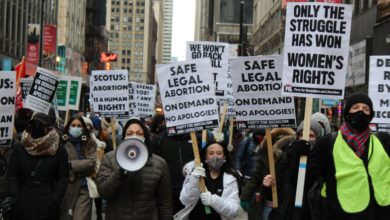Six months ago the U.S. Supreme Court’s Dobbs v. Jackson Women’s Health decision overturned abortion rights on a national level. In one stroke, abortion access was denied for some 18 million women in states which outlawed the needed procedure. Now abortion rights supporters have just received some good news.
On Jan. 3, the Food and Drug Administration announced that select pharmacies can now distribute the abortion pill mifepristone to consumers if they have a prescription. On Jan. 5, the South Carolina Supreme Court struck down a six-week abortion ban making abortion once again legal in that state.
South Carolina court ruled 3-2 that an abortion ban after six weeks of pregnancy violates the state constitution which opposes “unreasonable invasions of privacy.” Abortion is now legal up to 22 weeks gestation there. South Carolina, politically known for a long history of conservative and misogynistic legislation, is now the only deep southern state to protect abortion rights in its constitution.
The justices asserted their decision was not intended to be either “pro-choice” or “pro-life,” but rather that “the decision to terminate a pregnancy rests upon the utmost personal and private considerations imaginable.”
This ruling set a precedent that pro-choice advocates said they would pursue in other states where abortion has been criminalized. Many states have similar privacy clauses that could reasonably extend to abortion rights as well.
Grassroots rallied pro-abortion votes
The Dobbs ruling was clearly made against the popular will. Abortion was a magnet issue that drew voters to the polls in the 2022 midterm elections. In every single state with ballot measures on the right to abortion, people voted to protect it. States like Vermont, Michigan, California, and notably Kansas, all saw a powerful turnout of people voting in favor of its legality, in most part due to the tireless efforts of grassroots organizers and women’s groups.
State abortion restrictions are imposed by right-wing legislatures or courts against the will of the people. The results of the 2022 midterms showed that the majority of people do not rally behind them.
Now easier to get abortion pills
On Jan. 3, the FDA announced that pharmacies that get certification can distribute the abortion pill mifepristone to consumers who have a prescription for it. A previous long-standing FDA ruling required those seeking abortion to pick up the pills in person from abortion providers. This was then changed to allowing women to get the pills in the mail after a telehealth consultation. The Jan. 3 ruling is a further relaxation of restrictions. Major pharmaceutical chains CVS and Walgreens have both stated their intentions to apply for certification to distribute the drug.
The FDA also approved a label change for Plan B One-Step that clarifies that the “morning-after” birth control pill does not alter the course of existing pregnancies, and therefore should continue to be available over the counter. The rightwing has attacked that form of contraception pill, falsely claiming it disrupts pregnancies.
These measures do not come without challenges — pharmaceutical chains will not be able to supersede the law in states where distributing abortion medication is completely banned. Like all forms of health care under capitalism, experts say that the drug may remain inaccessible in rural areas, where there are fewer medical providers and pharmacies. Mifepristone’s accessibility also relies on individual providers’ willingness to prescribe it. The pill is approved for up-to-10-weeks gestation, and is not used in situations in which a later-stage abortion is necessary.
The people defend abortion rights
These steps speak to the population’s widespread animus towards the Supreme Court’s antiquated, undemocratic Dobbs ruling. The people have shown up in great force to defend abortion rights, and will continue to do so in the coming years when other democratic rights are expected to come under attack by the far-right minority. It’s not the Democratic Party, it’s grassroots organizers, women’s and LGBTQ groups and overworked medical professionals who are leading the fight, going door to door to explain electoral initiatives, and speaking publicly against the abortion bans.
Millions of people were awakened and mobilized by the Dobbs ruling, and not only to vote. Millions of others have found creative ways to protect one another. Many websites now help women get safe abortions. Interstate mutual aid networks have sprung up. There are many one-on-one efforts to assist friends and neighbors who need abortions. Abortion pills are being distributed in communities. Advocates are camping outside the homes of politicians until they promise justice. But the hard truth is that these projects, though they will surely continue, can be costly and exhausting.
What is needed immediately is swift action at the federal level to permanently protect abortion alongside all other democratic rights not explicitly mentioned in the U.S. Constitution. Democrats in office have avoided taking this action for decades at the behest of wealthy party strategists who viewed the volatility of the abortion rights issue as mostly an opportunity to rake in donations from the working class. For the Biden administration and Congress to reverse the impacts of Dobbs, the people may need to show that they can seriously challenge their power and wealth.
In the meantime, we can all take a moment to appreciate the good news before we march forward in the ongoing fight for our rights.





